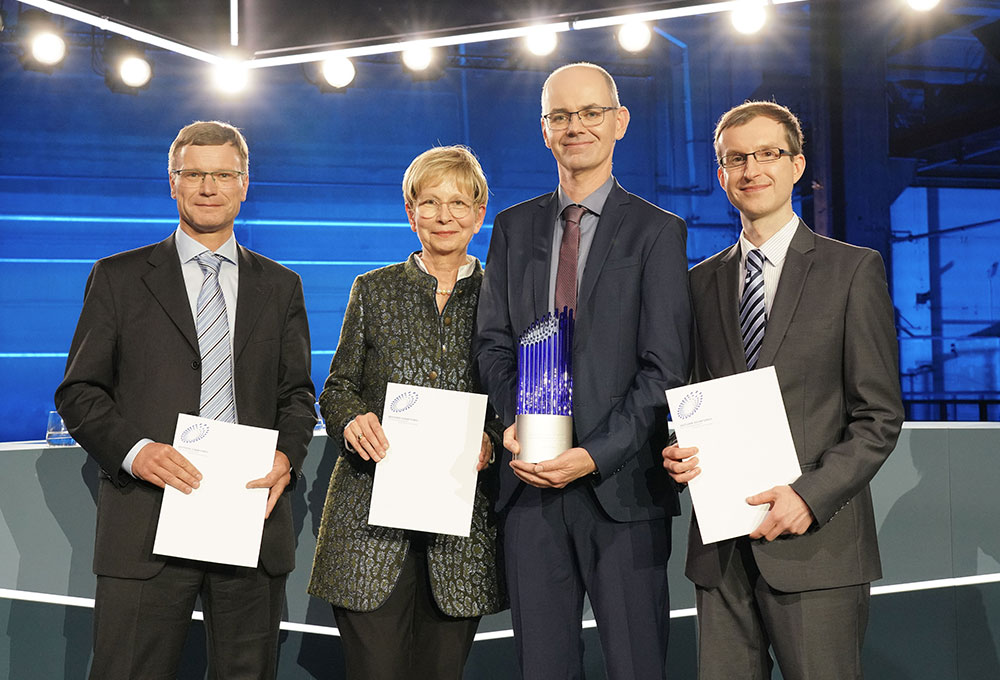
Inventor and innovation awards promote the development of inventiveness, innovation drive and progress. The prizes awarded impressively show how important the protection of innovations made by individuals or teams is, e.g., in order to support further research or create new jobs.
Last year, the President and other senior executives of the DPMA were once again members of juries or boards of trustees. In addition, our patent examiners proposed outstanding innovations for recognition.
In 2022, the DPMA was involved in the following awards:
www.deutscher-zukunftspreis.de/en
The Deutscher Zukunftspreis award is the badge for excellent inventions; it recognises the level of scientific and technological innovation, successful commercialization and the creation of sustainable jobs. Furthermore, it aims to encourage young people to choose scientific and technical subjects. This award comes with a prize money of 250,000 euros and is presented by the Federal President in person. The DPMA President is a member of the board of trustees, which determines the direction of selection decisions. The DPMA is entitled to make promising proposals to the jury which will then be considered in the procedure for deciding on the nominations or the prize winners.
The 26th Deutscher Zukunftspreis was presented by Federal President Frank-Walter Steinmeier on 17 November 2022 at an evening event at Kraftwerk Berlin, an event location. The ceremony was broadcast via live stream and subsequently shown on the German TV channel ZDF. The DPMA had proposed two of the three nominated teams. “The nominated teams are tackling pressing problems of humankind and are offering impressive solutions in their respective fields. With a visionary eye, all three of them have been pushing their innovations forward for a long time. Their success is the result of hard and persistent research work,” DPMA President Cornelia Rudloff-Schäffer (retired since February 2023) said.
Federal President Frank-Walter Steinmeier presented the team around Dr Thomas Kalkbrenner, Dr Jörg Siebenmorgen and Ralf Wolleschensky, of ZEISS Research Microscopy Solutions in Jena, with the 2022 Deutscher Zukunftspreis award for the development of a high-resolution 3D fluorescence microscope for the long-term examination of biological samples. The team was proposed by the DPMA.
The new fluorescence microscope minimises phototoxicity, that is, the damage inflicted on living organisms by the absolutely necessary light. Cells can thus be observed over longer periods of time without results being distorted. The device can also be easily operated by non-academic staff and enables the continued use of established sample preparations. It also allows high-throughput screening, that is, the rapid analysis of a large number of samples.
“We are very pleased that the jury has selected the innovation proposed by our office for this prestigious award,” the DPMA President said and added: “More than almost any other instrument, the microscope has contributed to promoting research and innovation. With their new technology, the scientists have improved microscopy to a level never seen before. This allows new, ground-breaking findings and innovations to be made which benefit people, including a lot of very sick people.”
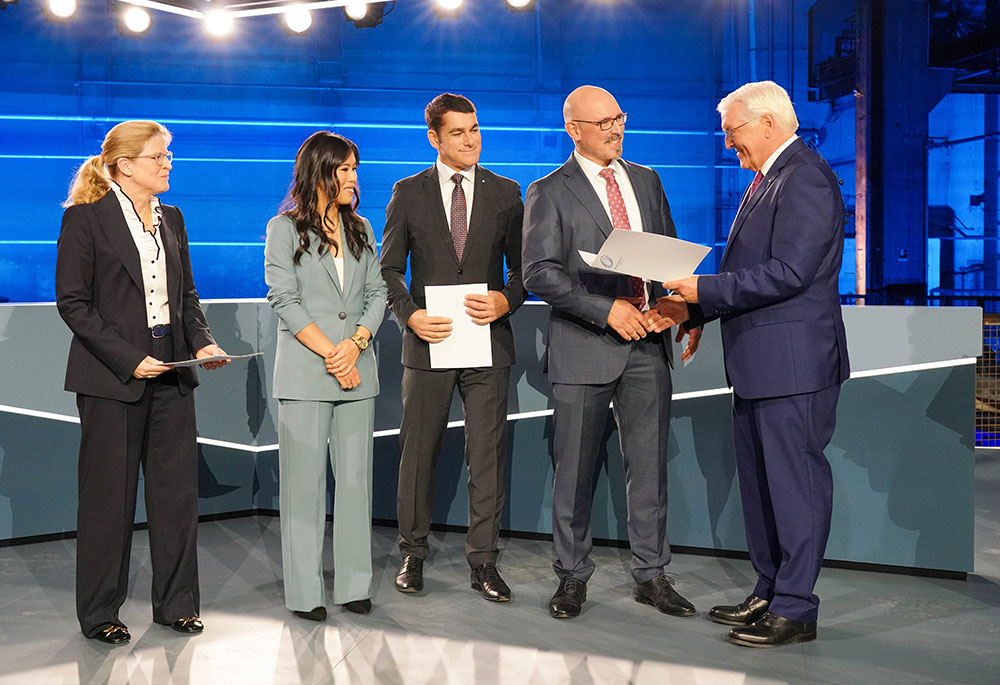
Two other innovations were also nominated for the 2022 Deutscher Zukunftspreis award:
Stefan Vilsmeier and Claus Promberger of Munich-based Brainlab AG and Prof Cordula Petersen of the University Medical Center Hamburg-Eppendorf have developed a system for high-precision patient positioning and monitoring for radiotherapy — such as for lung cancer. The new “ExacTrac Dynamic” system monitors the patient's movement and the respiration-induced tumour motion. For this purpose, measurement data from a 3D surface camera and a thermal sensor are combined with stereoscopic real-time X-ray data. Software calculates a correlation model of the internal and surface movement. This allows the system to position the X-ray beam precisely at the tumour. Damage to the surrounding healthy tissue is thus minimised. This innovation was also proposed to the jury by the DPMA.
Thomas Speidel and Dr Thorsten Ochs of ads-tec Energy GmbH in Nürtingen and Stefan Reichert of the Fraunhofer-Institute for Solar Energy Systems ISE in Freiburg were also nominated. They use their “ChargeBox” to enable nationwide ultra-fast charging of electric vehicles (EV) even in the existing, often power-limited grid. For this purpose, battery systems are used as buffer storage between the low-voltage grid and the vehicle. EV charging is thus possible even in city centres and remote rural areas with low-power grid connections.
The DPMA is entitled to nominate projects for the Deutscher Zukunftspreis award to the jury:
Please draw our attention to your projects! Proposals for nominations for the 2024 Deutscher Zukunftspreis award can be submitted at any time until the beginning of November 2023. For more information, visit our website.
Every year, the European Patent Office (EPO) awards the European Inventor Prize, which recognises inventors from Europe and all over the world who have contributed extraordinarily to social development, technological progress and economic growth. The awards are presented in the categories “Industry“, “Research”, “Small and medium-sized enterprises (SMEs)”, “Non-EPO countries” and “Lifetime achievement”. In 2022, “Young Inventors” were also specifically recognised for the first time. A “Popular Prize”, in which the winner is selected by a public vote rather than the jury, was also awarded once again. The examiners of the DPMA submit nomination proposals. A nomination requires at least one finally granted European patent.
“The European Inventor Award honours the most outstanding international innovators,” DPMA President Cornelia Rudloff-Schäffer said on the occasion of the award ceremony on 21 June 2022. Two German teams of researchers were nominated for the award, too.
In the “Industry” category, the German engineers Frank Herre, Hans-Georg Fritz, Timo Beyl, Marcus Kleiner and Benjamin Wöhr, of Dürr Systems AG, were among the three nominated teams. Their automated automotive paint system applies paint in such a manner that it is possible to reduce the amount of paint and energy needed by 20% and 30%, respectively, and to better respond to individual customer requests.
In the “SMEs” category, Joachim Fiedler (of Fidlock GmbH), a German inventor and cellist, was nominated. He has developed innovative fasteners that combine magnets with a mechanical closing device, so they can easily be opened with one hand.
Moreover, DPMA President Cornelia Rudloff-Schäffer warmly congratulated Katalin Karikó, biochemist and mRNA pioneer, on receiving the award in the “Lifetime achievement” category. “Katalin Karikó’s outstanding innovations in mRNA technology are a phenomenal lifetime achievement. She has showed that scientific excellence combined with tenaciousness and conviction can lead to great things,” the DPMA President said, and added: “The COVID-19 vaccine co-developed by Ms Karikó on this basis at BioNTech in Mainz is a key instrument for mitigating the COVID-19 pandemic. And it is quite possible that the mRNA technology will make further ground-breaking progress in medicine possible.”
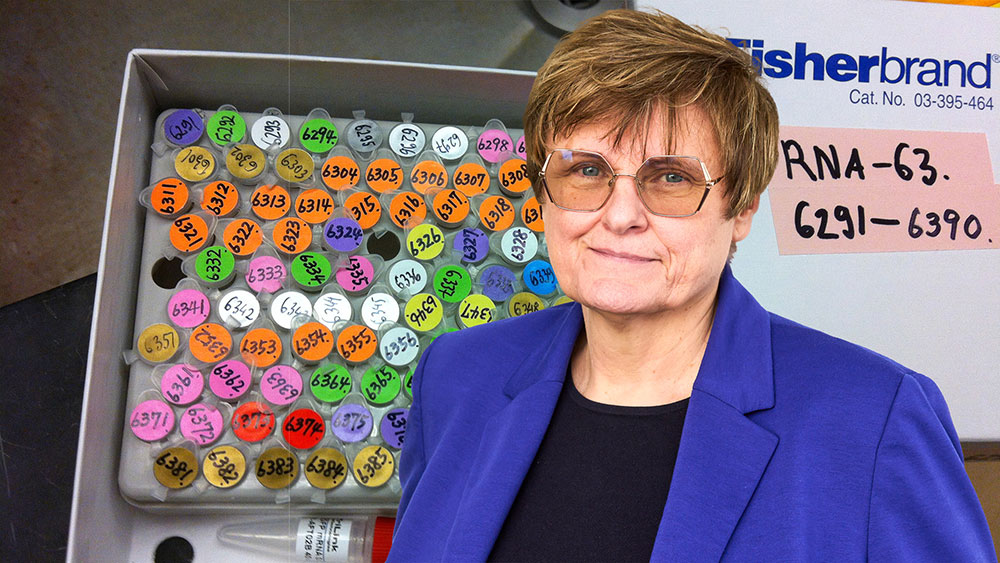
www.innovationspreis-bayern.de (in German)
The Bavarian Innovation Prize is awarded every two years by the Bavarian Ministry of Economic Affairs, Regional Development and Energy, the Federation of Bavarian Chambers of Crafts (Arbeitsgemeinschaft der bayerischen Handwerkskammern) and the Federation of Bavarian Chambers of Industry and Commerce (Bayerischer Industrie- und Handelskammertag). It honours Bavarian companies whose product and process innovations as well as innovative technology-oriented services have been successfully established in the market or whose market success is foreseeable.
“The Bavarian Innovation Prize is an impressive example of how small and medium-sized enterprises, in particular, also contribute highly creative technical solutions to our innovative capacity,” DPMA President Cornelia Rudloff-Schäffer said and added: “The prize winners from all over Bavaria represent a broad range of innovation activity — from highly specialised industrial manufacturing processes to applications that are a direct help to people.”
The DPMA President paid particular tribute to the innovation made by Erlangen-based Evosys Laser GmbH, the winner of the main prize. In this innovative process, plastic workpieces are welded by sequential irradiation with two laser beam sources. The use of two different wavelengths that alternate according to a certain time pattern allows better control of the energy introduced and the entire welding process: “The new process of Evosys GmbH takes an established technology to a higher level. It allows manufacturers worldwide to increase the efficiency of their production and offer their customers better products,” Cornelia Rudloff-Schäffer said.
The other prize winners are mentioned on the websites of the Bavarian Innovation Prize.
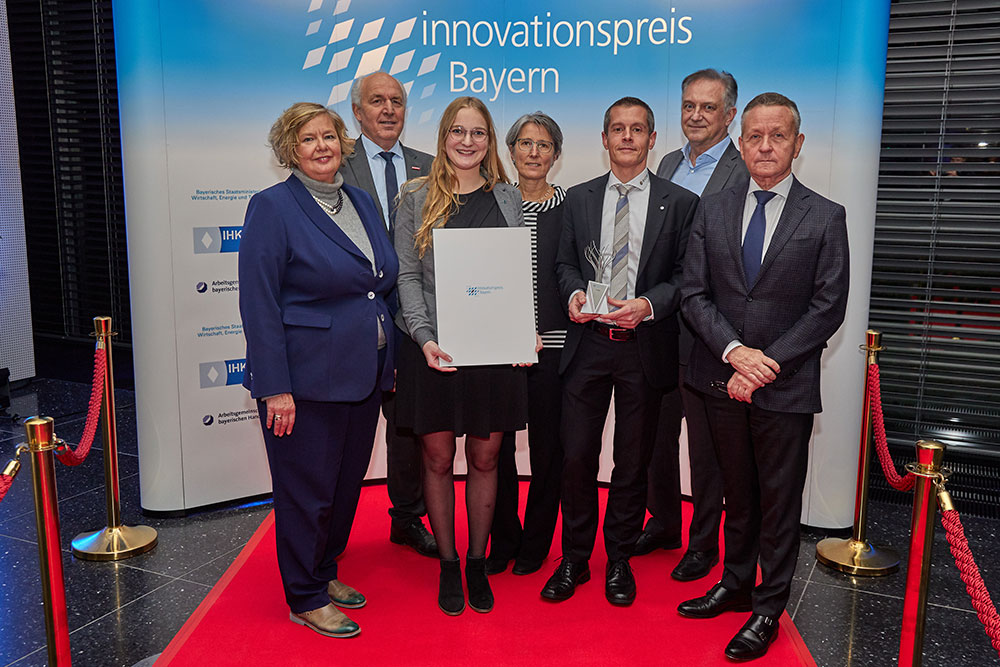
www.innovationspreis-thueringen.de
On 30 November 2022, the four categories of the “XXV Thuringia Innovation Award 2022” as well as the Special Award for Young Enterprises and the Ernst Abbe Award for Innovative Entrepreneurship were presented jointly by the Thuringian Minister of Economic Affairs, Science and the Digital Society, Wolfgang Tiefensee, the Foundation for Technology, Innovation and Research of Thuringia (STIFT), TÜV Thüringen and the Ernst Abbe Foundation in Weimar. The prize money, which is one of the highest for innovation awards in Germany, amounted to a total of 100,000 euros for the five former individual prizes.
DPMA President Cornelia Rudloff-Schäffer warmly congratulated the winners of the Thuringia Innovation Award: “The award-winning inventions show the extraordinarily high innovative capacity of Thuringia,” the DPMA President emphasised, and added: “We are pleased that innovative activity is not limited to the well-established successful major companies, but SMEs also put excellent innovations on the market.”
DPMA President Rudloff-Schäffer emphasised that, with 25 patent applications per 100,000 population last year, Thuringia kept its top position among the Central and Eastern German Länder. Even in the relevant ranking of all German Länder, Thuringia came in 5th, a remarkable position.
Markus Ortlieb, head of the Jena sub-office, once again represented the DPMA in the 19-member jury, particularly clarifying questions relating to the state of the art and IP rights across all categories. The criteria for the jury’s decision to grant the award include the degree of innovation, entrepreneurial achievement, functionality, practical value and economic success. Furthermore, the competition entries must already be on the market or be about to be launched. Another requirement is that the development and production of the submitted innovation has predominantly taken place in Thuringia.
The prize winners of the individual categories can be found on the websites of the Thuringia Innovation Award.
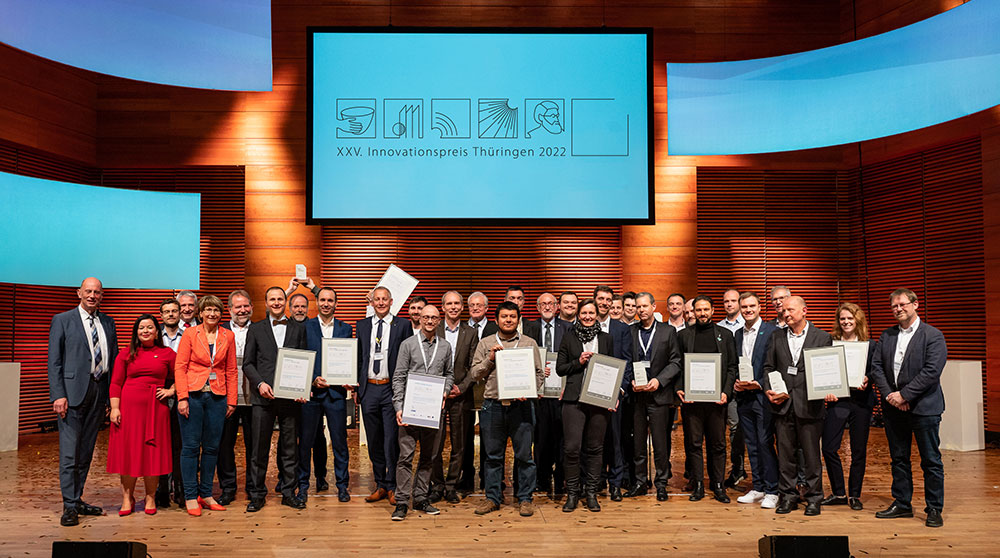
Every year, the Falling Walls Foundation honours ground-breaking innovations in the categories “Life Sciences”, “Physical Sciences”, “Engineering and Technology”, “Social Sciences and Humanity”, “Art and Science”, “Future Learning”, “Science and Innovation Management“, “Emerging Talents”, “Science Start-ups“ and “Science Engagement”. The foundation is supported by the Federal Ministry of Education and Research, the foundation Robert Bosch Stiftung, the Helmholtz Association, the Berlin Senate and a number of renowned scientific institutions, foundations, companies and non-governmental organisations.
Involved for the first time in this award, the DPMA proposed five projects. Information on the many winners is available on the websites of the Falling Walls Science Summit.
“Jugend forscht is a fitting youth contest for Germany, since we are a nation of developers, tinkerers and inventors,” Federal Minister of Education and Research Bettina Stark-Watzinger said. This year, this was reflected once again by the creativity, the variety of problems tackled and the strong perseverance of the young scientists in getting from the idea to an item or process that works. At the national finals in Lübeck in May 2022, 168 young scientists presented their 108 very different projects.
For example, in the “Working World” field, Vincent Nack was able to convince the federal jury of the emergency brake assist system for bicycles he had developed himself. His “Bike Emergency Braking System” consists of a sensor system with ultrasonic sensors, a gyro stabiliser and an autonomous braking system. The sensor system can be fixed to the handlebar. In case of emergency, the system brakes for a controlled stop of the bicycle.
This year’s award of the Federal President for extraordinary work was bestowed on Hendrik Rider. He has developed a 2.5-metre-long water rocket that can fly up to 270 metres high. At its top, meteorological data such as temperature and air quality as well as position data are collected and transmitted to the ground station. The rocket is launched from a specially designed launch pad where the rocket is also fully automatically fuelled and controlled.
The winners of the individual categories are mentioned on the websites of the Jugend forscht contest.
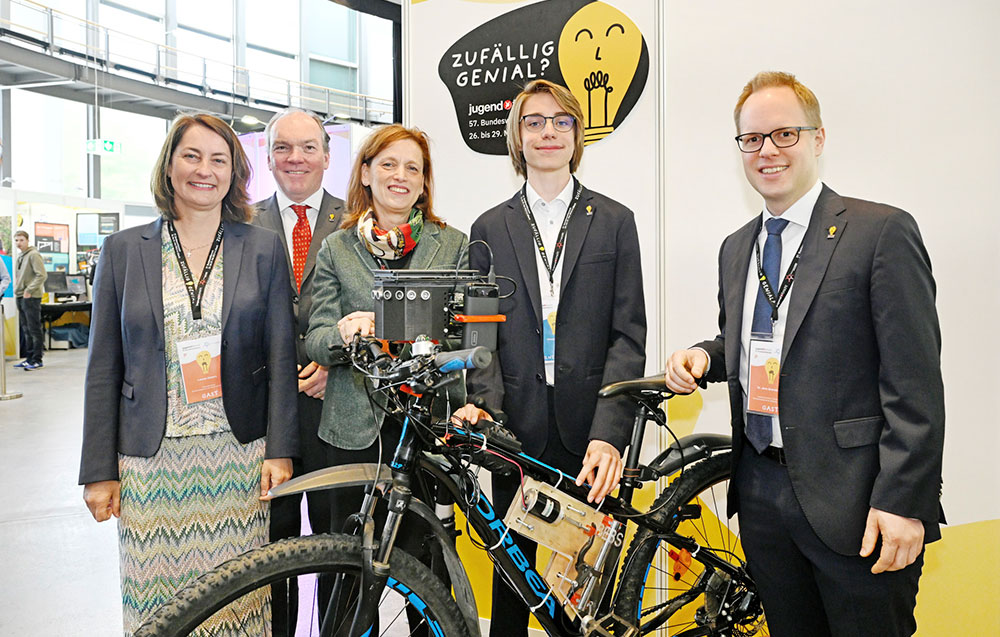
We wish all prize winners continued success in the future!
